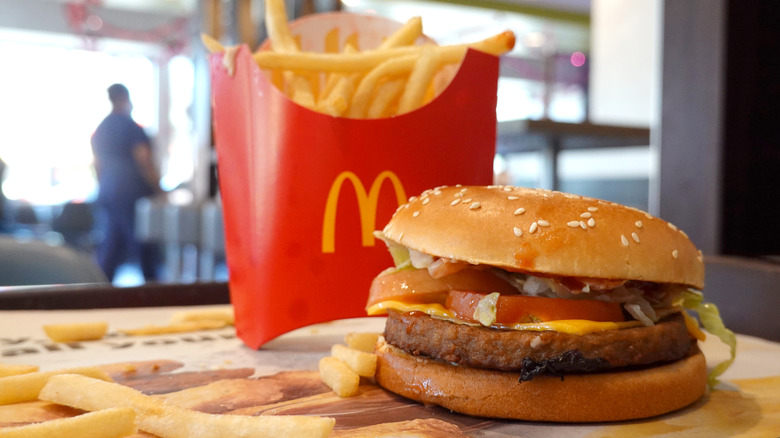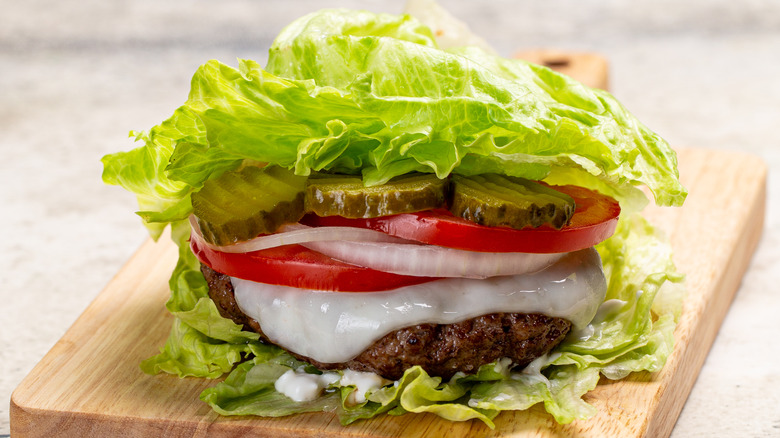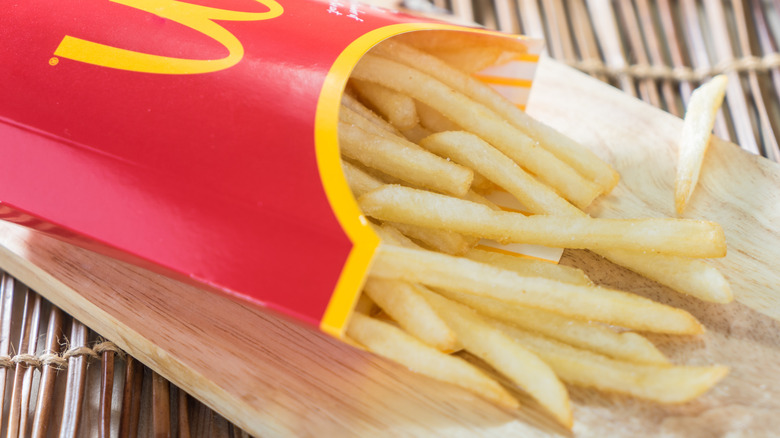The Reason McDonald's Doesn't Offer Gluten-Free Options Like Other Restaurants
As the most recognized and visited fast food restaurant around the world, it might seem strange that McDonald's does not offer any gluten-free options. You might be wondering why the burger giant cannot accommodate special diets when so many other franchises have gluten-free options. For McDonald's it's not worth the risk: It doesn't want to run the danger of cross-contamination.
Gluten contamination is very hard to control in most kitchen environments (via beyondceliac.org), and because gluten is a protein it can't be eliminated by the same cleaning techniques that work for bacteria. It doesn't mind heat, so anything fried in oil that contained a trace of flour would be contaminated and inedible for someone with a gluten intolerance. This is true for all home and restaurant kitchens, and McDonald's is no different in this regard. It only takes a tiny bit of gluten to make someone with celiac disease very sick. Because of this, using the same equipment or utensils that have processed ingredients with gluten can have disastrous results. Consider the fact that flour can actually become airborne quite easily while remaining invisible to the naked eye and that even inhaled gluten can make someone sick (via the National Celiac Association), and you'll have a good idea of just how hard it is to keep trace amounts of gluten out of foods that are supposed to be gluten-free.
Risk of liability with gluten-free
For McDonald's, food safety is more important than fully customizable orders — this is the same reason you can't order runny eggs. It might seem like McDonald's could make French fries without wheat derivatives or offer burgers in lettuce wraps instead of buns, but it's not that simple. Breading from fish filets can contaminate fryer oil and crumbs are pretty much impossible to keep off of preparation surfaces. In order to safely guarantee gluten-free foods, McDonald's would likely require an entirely separate kitchen and that's not something the chain has been open to quite yet.
A number of fast-food restaurants offer gluten-free options in spite of these risks. Five Guys will make its burgers in either a bowl or a lettuce wrap upon request. Wendy's, Chick-fil-A, and Chipotle are also among quite a few chains that offer items without any gluten-containing ingredients. However, each chain has to let the customer know that there is always a risk of contamination in kitchens and prep areas.
McDonald's, on the other hand, doesn't appear interested in taking on the potential liability that can come with offering menu items that are marketed as gluten-free in spite of being made in a gluten-heavy kitchen. At least not in the U.S. The franchise does list a number of items as gluten-free in the UK with the caveat that cross-contamination can occur. That list includes hash browns and French fries — which are apparently not made with wheat derivatives across the pond.
McDonald's French fry scandal
While it seems reasonable that McDonald's would want to avoid any such liability in the U.S. the company has an additional reason to steer clear of accommodating special diets. It has already been burned in this area before. You may have forgotten about the French fries scandal back in the '90s, but McDonald's certainly hasn't.
The fast food chain suffered intense backlash when it failed to inform consumers that it had added ingredients containing beef back to its fries after switching out the beef tallow that they were originally cooked in. Not only did vegetarians and vegans feel that they were duped into consuming food that didn't meet their dietary choices, but Hindus were also understandably upset. Since cows are a sacred animal in Hinduism, McDonald's dishonesty resulted in many people unknowingly dishonoring their own religious beliefs. So it's no surprise that the company doesn't want to risk breaking their customers' trust again with gluten-free foods that cannot be certified or guaranteed to be 100% percent free of contamination.


